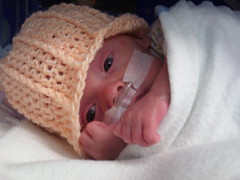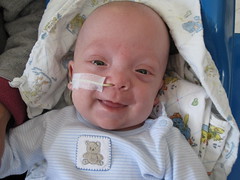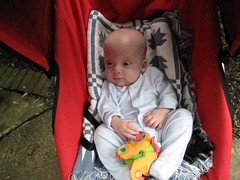We met with the NICU team and Dr. M., the chief pediatric neurologist. Dr. M. had reviewed Max's MRIs, head ultrasounds and CT scan results, and examined Max. Today he gave us his full and frank assessment. Max has an "80 to 90 percent" chance of developing cerebral palsy and a 100 percent chance of having a developmental delay. (This latter being a safe bet because Max is already developmentally delayed.)
Max has two ongoing hydrocephalus processes. The first is the standard problem of overproduction of CSF, which collects in his ventricles and pushes outward. With Max's head growth accelerating recently, the prospect of surgery to place a shunt has again become very serious.
The second is called "hydrocephalus ex vacuo". Hydrocephalus, like nature, abhors a vacuum. As brain tissue destroyed during Max's head bleeds is cleaned away by the body's waste disposal system, the ventricles expand to fill the space left by the shrinking brain. Dr. M. found fairly pronounced tissue loss on both sides of the brain, although perhaps a little greater loss on the left side.
In addition, because Max's head bleeds were more involved than previously thought, Max is at increased risk for CP (which we've discussed), permanent cognitive impairment and seizures (i.e. epilepsy).
We had been warned that Dr. M.'s bedside manner was lacking. However, we found him refreshingly candid. We asked for the straight story and we got it. He seems to be the guy that the NICU team depend on to deliver the really bad news, and I'm sure it makes for a series of tense interactions with parents. That said, Dr. M. did try to cheer us up with a story that was hilarious, in a horrible kind of way. He told us about an adult patient of his who had severe CP: She couldn't talk, was in a wheelchair, the full meal. However, she had risen to an extremely senior position in the Pentagon because of her facility with, as Dr. M. put it, "computers". After the initial shock wore off Carolyn and I laughed and told him that this was possibly the most distressing story we could imagine a doctor in his position telling parents in our position. As Carolyn said: "thanks for that really heart-warming story doc" as she and I laughed. No-one else in the room seemed to find it as amusing as we did.
In part, Carolyn and I remain in denial about the huge challenges and risks that Max faces. But also we feel very strongly that there is a bright and lovely person inside that enormous head of his. We won't know the extent of Max's CP for a couple of years. No matter what, we will boost Max's neurological function to the extent possible with therapy and treatment.
skip to main |
skip to sidebar

Max was born in October 2008 at Georgetown University Hospital. After more than four months at GUH, Max moved to the HSC Pediatric Center in March 2009. He came home six months after he was born, in April 2009.
A TUBE-FREE MORNING

Start Here: A list of posts with background information
- We're home! (leaving the hospital with Max)
- The hospital at home (what it's like to care for Max at home)
- Max in action (see Max do his tricks)
- How is Max? (update April 2009)
Most recent photos of Max
Blog Archive
-
▼
2009
(224)
-
▼
February
(41)
- Evening update (Saturday 2/28)
- Evening Update (Friday 2/27)
- Out for a stroll
- Evening update (Thursday 2/26)
- Proposed feeding schedule
- Evening update (Wednesday 2/25)
- Evening update (Tuesday 2/24)
- Evening update (Monday 2/23)
- Evening Update (Sunday 2/22)
- Sunday in the NICU
- Evening Update (Saturday 2/21)
- Evening update (Friday 2/20)
- Evening Update (Thursday 2/19)
- Assessment by the peds neuro service
- Max relaxing in the new crib
- Max's new digs
- Evening Update (Wednesday 2/18)
- Evening Update (Tuesday 2/17)
- Evening Update (Monday 2/16)
- Evening Update (2/15)
- Late night update (Saturday 2/14)
- Max and the soothie
- Evening update (Saturday 2/14)
- Gorilla nursery
- Morning update (Monday 2/14)
- Evening Update (Friday 2/13)
- Treating the baby, not the x-ray (part 2)
- Evening Update (Thursday 2/12)
- Evening update (Wednesday, 2/11)
- Max's next stop
- Max's second report card
- Evening update (Sunday 2/8)
- Evening Update (Saturday 2/7)
- Evening Update (Friday 2/6)
- Evening Update (Thursday 2/5)
- A day at the NICU
- Holding paws with Max
- Evening Update (Tuesday 2/3)
- Evening Update (Monday 2/2)
- Late night update (Sunday 2/1)
- Evening Update (Sunday 2/1)
-
▼
February
(41)



